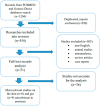Alterations of the Skin and Gut Microbiome in Psoriasis and Psoriatic Arthritis
- PMID: 33924414
- PMCID: PMC8069836
- DOI: 10.3390/ijms22083998
Alterations of the Skin and Gut Microbiome in Psoriasis and Psoriatic Arthritis
Abstract
Numerous scientific studies in recent years have shown significant skin and gut dysbiosis among patients with psoriasis. A significant decrease in microbiome alpha-diversity (abundance of different bacterial taxa measured in one sample) as well as beta-diversity (microbial diversity in different samples) was noted in psoriasis skin. It has been proven that the representation of Cutibacterium, Burkholderia spp., and Lactobacilli is decreased and Corynebacterium kroppenstedii, Corynebacterium simulans, Neisseria spp., and Finegoldia spp. increased in the psoriasis skin in comparison to healthy skin. Alterations in the gut microbiome in psoriasis are similar to those observed in patients with inflammatory bowel disease. In those two diseases, the F. prausnitzii, Bifidobacterium spp., Lactobacillus spp., Parabacteroides and Coprobacillus were underrepresented, while the abundance of Salmonella sp., Campylobacter sp., Helicobacter sp., Escherichia coli, Alcaligenes sp., and Mycobacterium sp. was increased. Several research studies provided evidence for the significant influence of psoriasis treatments on the skin and gut microbiome and a positive influence of orally administered probiotics on the course of this dermatosis. Further research is needed to determine the influence of the microbiome on the development of inflammatory skin diseases. The changes in microbiome under psoriasis treatment can serve as a potential biomarker of positive response to the administered therapy.
Keywords: microbiome; microbiota; psoriasis; psoriatic arthritis.
Conflict of interest statement
The authors declare no conflict of interest.
Figures


References
-
- Iannone L.F., Bennardo L., Palleria C., Roberti R., De Sarro C., Naturale M.D., Dastoli S., Donato L., Manti A., Valenti G., et al. Safety profile of biologic drugs for psoriasis in clinical practice: An Italian prospective pharmacovigilance study. PLoS ONE. 2020;15:e0241575. doi: 10.1371/journal.pone.0241575. - DOI - PMC - PubMed
-
- Hsu D.K., Funga M.A., Chen H.L. Role of skin and gut microbiota in the pathogenesis of psoriasis, an inflammatory skin disease. Med. Microecol. 2020;100016:1–8. doi: 10.1016/j.medmic.2020.100016. - DOI
Publication types
MeSH terms
Grants and funding
LinkOut - more resources
Full Text Sources
Other Literature Sources
Medical
Miscellaneous

